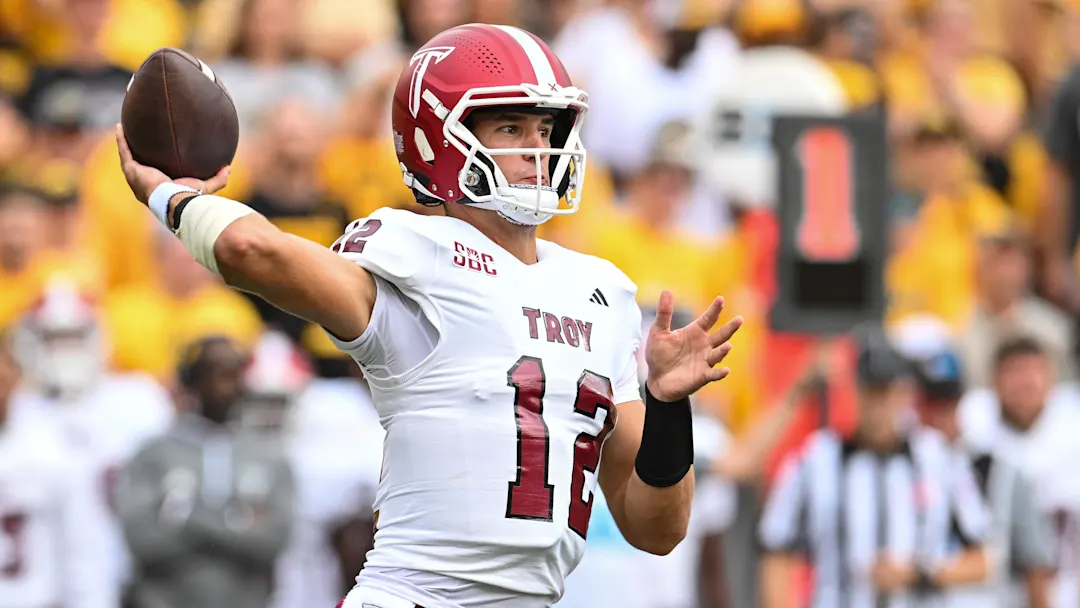The Texas Longhorns have made a significant addition to their quarterback room with the signing of Troy transfer Gunnar Watson, a seasoned and battle-tested signal-caller whose arrival in Austin adds both experience and depth to the roster. Watson, who entered the transfer portal following the conclusion of the 2024 season, brings a wealth of knowledge, over 10,000 career passing yards, and a proven ability to lead under pressure — all qualities that will be invaluable as Texas navigates the challenges of the SEC and beyond.
Watson’s move to Texas represents the next chapter in a college career that has been defined by perseverance, leadership, and growth. The 6-foot-3, 215-pound quarterback from Butler, Georgia, was a mainstay for the Troy Trojans over the last several seasons. He started more than 40 games, led his team to multiple bowl appearances, and became a fixture in the Sun Belt Conference’s quarterback hierarchy. His decision to enter the transfer portal was not born of dissatisfaction, but rather an eagerness to take on a new challenge, and few programs offer a stage as grand or as demanding as Texas.
For the Longhorns, the addition of Watson could not come at a better time. Following the departure of Quinn Ewers to the NFL and the high-stakes pressure surrounding Arch Manning’s emergence, head coach Steve Sarkisian knew that the team needed a veteran presence — someone capable of stepping in if necessary and helping maintain continuity and focus throughout the offseason and into the fall. Watson fits the bill perfectly. While he is not expected to unseat Manning as the presumptive starter, his presence creates a healthy competition and provides Texas with a capable backup who could take the reins if called upon.
What makes Watson particularly valuable is not just his stats, but the intangibles he brings. At Troy, he earned the respect of his teammates through hard work, consistency, and resilience. He threw for over 3,000 yards in multiple seasons, delivered clutch performances in rivalry games, and was often praised for his football IQ. He has seen just about every defensive scheme a college quarterback can face, and his ability to read coverages and adjust protections at the line of scrimmage could serve as an important teaching tool for younger players like Manning and true freshman recruit Trey Owens.
Watson’s decision to choose Texas also says something about the direction and reputation of the program. In years past, a Group of Five graduate transfer might have been hesitant to join a blue-blood program with an entrenched starter and intense media scrutiny. But Watson’s move signals his belief in the coaching staff, the facilities, and the culture Sarkisian has built. It’s also a sign of maturity — an understanding that being part of something bigger, even if it means not being the face of the team, can be equally fulfilling.
For Sarkisian, who has coached some of the best quarterbacks in college football, the task now becomes integrating Watson into the Longhorn system quickly and efficiently. Spring practices already offered a glimpse of what the quarterback room might look like in 2025. Arch Manning drew most of the attention, as expected, but insiders say that the staff has been deliberate about creating an environment that fosters growth and mutual support rather than cutthroat competition. Watson’s demeanor and professionalism will only strengthen that dynamic.
Watson’s experience also gives Sarkisian flexibility. If Manning struggles early or is forced to miss time due to injury, the staff won’t have to rely on an untested freshman or walk-on. With Watson, they have a quarterback who has thrown more than 90 career touchdowns, played in pressure-packed environments, and understands what it takes to prepare like a starter week in and week out. That kind of security blanket is rare in college football, and it could be the difference between a playoff berth and a season derailed by uncertainty at the most important position on the field.
From Watson’s perspective, the move to Texas is both a personal and professional opportunity. It’s a chance to prove he can compete at the highest level of the sport and perhaps position himself for a future in coaching or professional football. The national exposure that comes with playing for Texas — including televised games, elite facilities, and access to NFL scouts — offers him a final platform to showcase his skills and football acumen.
Beyond the Xs and Os, Watson’s addition is expected to have a ripple effect across the locker room. Younger quarterbacks often benefit immensely from being around veterans who model the right way to study film, take care of their bodies, and handle the mental grind of a long season. Watson has been praised in the past for his leadership style, which blends quiet confidence with an ability to connect with teammates on a personal level. His presence could help ease the transition for Arch Manning as he moves from highly-touted recruit to full-time starter in one of the most high-pressure environments in college football.
The Texas staff has also emphasized the importance of depth in every position room, and quarterback is no exception. Injuries are inevitable in a physical conference like the SEC, and having an experienced backup like Watson is a luxury few teams possess. With the Longhorns aiming for an SEC Championship and a potential College Football Playoff appearance, there’s little room for error — and Watson ensures that the team is covered no matter what.
It’s worth noting that Watson’s path to Austin was anything but conventional. A former three-star recruit, he committed to Troy over offers from smaller programs and had to fight for every opportunity he earned. There were seasons of highs and lows, but through it all, he remained focused, steady, and driven. That mindset — that blue-collar, chip-on-the-shoulder mentality — fits well with what Sarkisian wants from his team as it prepares to compete with the likes of Alabama, Georgia, and LSU. It’s not just about talent anymore; it’s about grit, leadership, and being mentally tough enough to handle adversity.
The move also brings into focus the changing nature of college football’s transfer landscape. In a sport increasingly defined by mobility and NIL opportunities, Watson’s transfer serves as a reminder that experience still matters. Developmental stories like his are becoming rarer in a world dominated by early departures and high-profile flips, but his journey is proof that long-term growth and consistent performance can still earn a quarterback a spot at the table with the game’s elite.
As for the fans in Austin, the signing of Watson might not create the same buzz as a five-star freshman, but those close to the program know how crucial these moves can be. Games are often won or lost not by the starters, but by the depth and maturity of the entire roster. Watson won’t be on the cover of magazines or leading social media highlight reels, but when Texas needs a steady hand in practice, a voice in the locker room, or a leader in a late-game situation, they’ll be glad he’s on their side.
In the end, the partnership between Gunnar Watson and the Texas Longhorns is a win-win. Texas gains a reliable, seasoned veteran who can mentor, compete, and contribute in meaningful ways. Watson gets one final shot to be part of something special — a national brand with championship aspirations. It’s the kind of move that might not dominate headlines in the offseason, but could end up playing a pivotal role when the games begin this fall.
Whether or not Watson sees significant playing time, his impact on the Longhorns will be felt in the preparation, culture, and overall maturity of the quarterback room. And in the unpredictable world of college football, that might just make all the difference.



